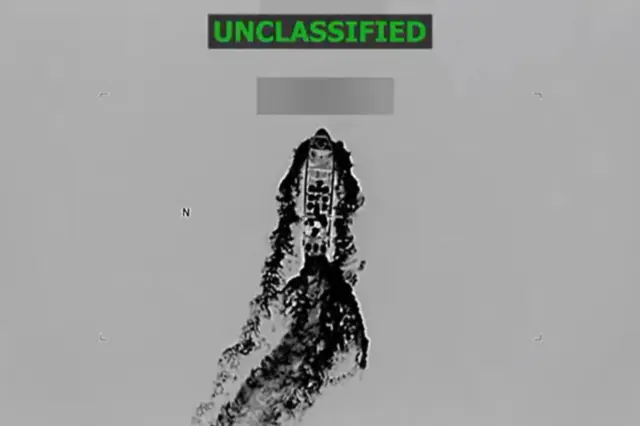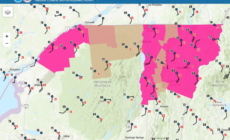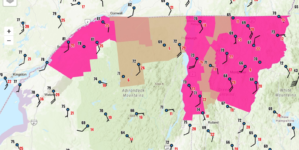-
Santos Thanks Trump During TV Appearances After His Release From Prison - 8 mins ago
-
Chiefs’ Patrick Mahomes Issues Major NFL Warning After Dominant Win - 14 mins ago
-
Hakeem Jeffries campaigns for Proposition 50 at L.A.’s Black churches - 15 mins ago
-
Red Flag Warnings Issued in These States: What To Know - 50 mins ago
-
Sam Rivers, Bassist for Limp Bizkit, Dies at 48 - 52 mins ago
-
Healthcare workers strike at Kaiser Permanente ends after 5 days - 56 mins ago
-
Panthers’ Bryce Young Exits Game With Worrisome Ankle Injury - about 1 hour ago
-
U.S. Kills 3 on Boat Suspected of Smuggling Drugs for Colombian Rebels - 2 hours ago
-
College Football Program Fires Coach After 12-Point Loss - 2 hours ago
-
A Fragile Cease-fire Between Afghanistan and Pakistan Ends Violence, for Now - 2 hours ago
Defense Secretary Hegseth defends latest boat strike off Venezuela
In an X post on Sunday, Defense Secretary Pete Hegseth outlined the latest lethal strike on an alleged drug trafficking boat in the Caribbean off Venezuela, writing, “The vessel was known by our intelligence to be involved in illicit narcotics smuggling, was traveling along a known narco-trafficking route, and was transporting substantial amounts of narcotics.”
The post also included video of Friday’s strike, showing an explosion that Hegseth wrote killed “three male narco-terrorists.”
Why It Matters
The U.S. has carried out several strikes on alleged drug trafficking boats in the area since early September that has killed dozens.
President Donald Trump has made combating the opioid crisis, particularly the influx of illicit fentanyl, a central focus of his administration’s policies. Earlier this year, to address the sources of fentanyl trafficking, he imposed tariffs on imports from China, Mexico, and Canada. There are some legitimate medical uses for fentanyl, including post-surgery and severe pain relief, but it is often mixed in with other illicit drugs and can be fatal.
The opioid crisis has far-reaching impacts across the country. In 2024, the U.S. witnessed a significant decrease in opioid-related overdose deaths, dropping from 110,037 in 2023 to 80,391 in 2024, according to data from the U.S. Centers for Disease Control and Prevention (CDC).
U.S. officials framed these maritime strikes—like the latest attack near Venezuela—as part of an “armed conflict” with cartels, treating alleged traffickers as unlawful enemy combatants rather than criminals.
Meanwhile, the recent strikes have prompted strong condemnation from regional governments and some U.S. lawmakers, reigniting debate over the scope of presidential war powers and the role of U.S. military force in Latin America.

What To Know
Hegseth wrote in his X post on Sunday that the lethal strike on the alleged drug trafficking boat was ordered by Trump.
The strike was on a vessel affiliated with the Ejército de Liberación Nacional (ELN), a U.S.-designated terrorist organization, operating in the U.S. Southern Command (USSOUTHCOM) area of responsibility, according to the defense secretary.
“Our intelligence, without a doubt, confirmed that this vessel was trafficking narcotics, the people onboard were narco-terrorists, and they were operating on a known narco-trafficking transit route,” Hegseth wrote.
The strike marked the at least the fifth such operation in recent weeks, as U.S. officials linked Venezuelan and regional boats to drug trafficking routes.
Hegseth reported that three narco-terrorists were killed onboard the latest vessel, writing, “The United States military will treat these organizations like the terrorists they are—they will be hunted, and killed, just like Al Qaeda.”
South American leaders, including Venezuelan President Nicolás Maduro and Colombian President Gustavo Petro, have denounced the strikes as an attack on their sovereignty and suggested that the individuals killed may not be hardened criminals but marginalized youths. Petro characterized the strike as “murder,” while human rights groups and some U.S. lawmakers called for greater transparency regarding the identities of those targeted and the legal rationale for lethal force.
What People Are Saying
President Donald Trump wrote in a post on Truth Social on Sunday: “President Gustavo Petro, of Colombia, is an illegal drug leader strongly encouraging the massive production of drugs, in big and small fields, all over Colombia. It has become the biggest business in Colombia, by far, and Petro does nothing to stop it, despite large scale payments and subsidies from the USA that are nothing more than a long term rip off of America. AS OF TODAY, THESE PAYMENTS, OR ANY OTHER FORM OF PAYMENT, OR SUBSIDIES, WILL NO LONGER BE MADE TO COLOMBIA. The purpose of this drug production is the sale of massive amounts of product into the United States, causing death, destruction, and havoc. Petro, a low rated and very unpopular leader, with a fresh mouth toward America, better close up these killing fields immediately, or the United States will close them up for him, and it won’t be done nicely.”
Senator Rand Paul, a Kentucky Republican, said in an interview with NBC News’ Kristen Welker on Meet the Press on Sunday: “When you kill someone, you should know, if you’re not at war, not in a declared war, you really need to know someone’s name at least. You have to accuse them of something. You have to present evidence. So, all of these people have been blown up without us knowing their name, without any evidence of a crime.”
Senator Tim Kaine, a Virginia Democrat, said in a recent statement: “If my colleagues disagree and think a war with Venezuela is a good idea, they need to meet their constitutional obligations by making their case to the American people and passing an Authorization for Use of Military Force. I urge every senator to join us in stopping this Administration from dragging our country into an unauthorized and escalating military conflict.”
Anna Kelly, White House spokesperson, said in a previous email to Newsweek on October 15: “All of these decisive strikes have been against designated narcoterrorists bringing deadly poison to our shores, and the President will continue to use every element of American power to stop drugs from flooding into our country and to bring those responsible to justice.”
Samuel Moncada, Venezuela’s top envoy to the United Nations, said while condemning the U.S.’s military moves in the region: “There is a killer prowling the Caribbean, bloodthirsty, looking for wars. There is no justification at all, they are fabricating a war.”
What Happens Next?
The Trump administration signaled it would expand military interventions against suspected drug traffickers, announcing plans for a new Joint Task Force led by U.S. Southern Command.
Venezuela, meanwhile, has threatened to declare a state of emergency and has vowed to defend its sovereignty.
A bipartisan trio of senators led by Senator Kaine, and including Senators Adam Schiff and Paul, introduced a joint resolution to bar Trump from taking military action in Venezuela without congressional authorization. Senators are expected to vote on the joint resolution soon.
Source link




















